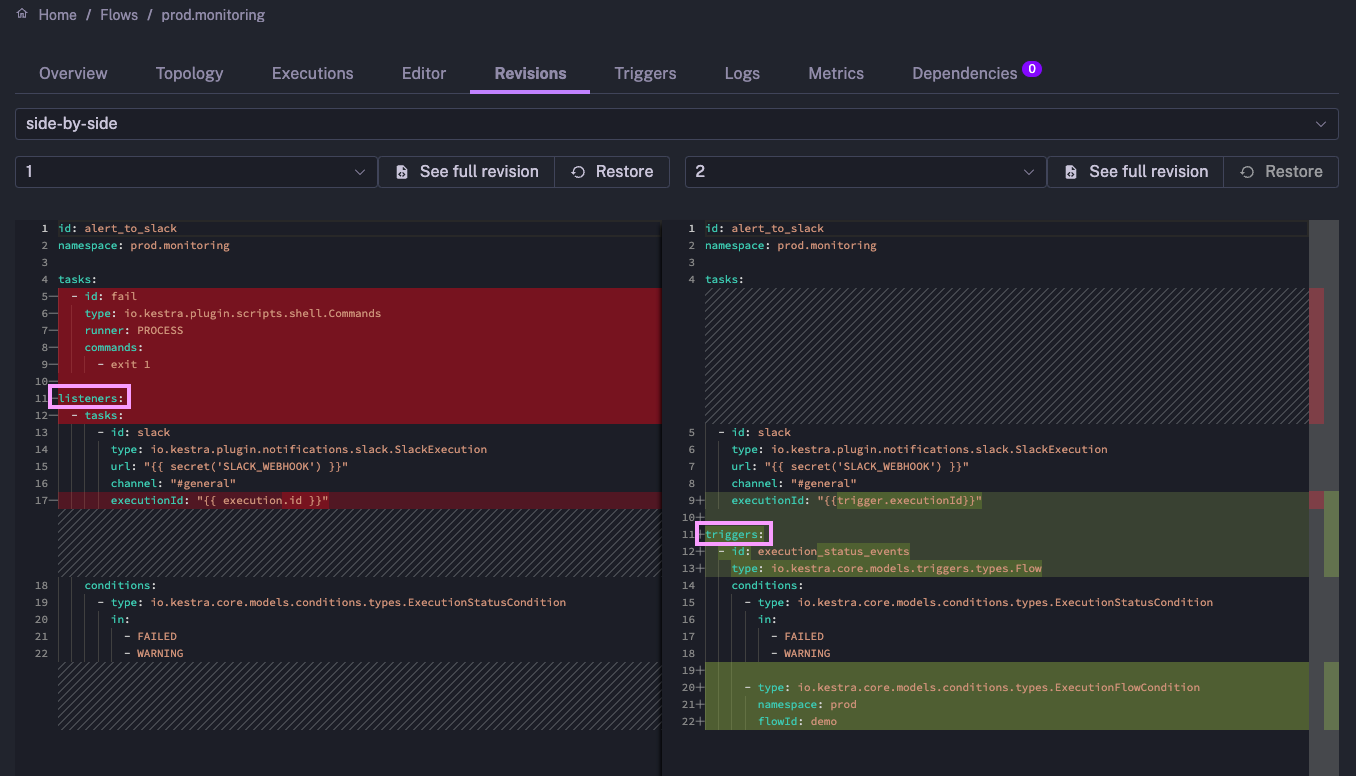 Deprecation of Listeners
Deprecation of Listeners
Release: 0.12.0
Listeners are deprecated and disabled by default starting from the 0.12.0 release. Please use Flow triggers instead.
Why listeners are deprecated
- The listener is a redundant concept. Flow triggers allow you to do all that listeners can accomplish and more. The only difference between listeners and triggers is that listeners are defined inline within the same flow code and are, therefore, more tightly coupled with the flow. In contrast, a Flow trigger is defined in a separate independent flow that can simultaneously listen to the condition of multiple flows that satisfy specific
conditions. This gives you more flexibility. - It is an extra concept that you, as a user, would need to learn even though you may not have to if you already know Flow triggers.
- It's a hard-to-grasp concept — listeners can launch tasks outside of the flow, i.e., tasks that will not be considered part of the flow but are defined within it. Additionally, the results of listeners will not change the execution status of the flow, so having them defined within the flow has caused some confusion in the past.
- Currently, listeners are mainly used to send failure (or success) notifications, and Kestra already has two concepts allowing you to do that:
triggersanderrors. Having three choices for such a standard use case has led to confusion about when to use which of them.
If you are using listeners and you are not ready to migrate to Flow triggers yet, add the following Kestra configuration option to still be able to use listeners:
kestra:
listeners:
enabled: true
Then, make sure to also add the following plugin defaults to your configuration to ensure that your conditions are working properly after the upgrade to any version after 0.12.0:
kestra:
tasks:
defaults:
- type: io.kestra.plugin.core.condition.DateTimeBetweenCondition
values:
date: "{{ now() }}"
- type: io.kestra.plugin.core.condition.DayWeekCondition
values:
date: "{{ now(format="iso_local_date") }}"
- type: io.kestra.plugin.core.condition.DayWeekInMonthCondition
values:
date: "{{ now(format="iso_local_date") }}"
- type: io.kestra.plugin.core.condition.TimeBetweenCondition
values:
date: "{{ now(format='iso_offset_time') }}"
- type: io.kestra.plugin.core.condition.WeekendCondition
values:
date: "{{ now(format='iso_local_date') }}"
Due to listeners' deprecation, we changed the default behavior of various io.kestra.core.models.conditions-type conditions to use the {{trigger.date}} as default value for the date property instead of using "{{ now(format='iso_local_date') }}". To ensure that your conditions are working properly after the upgrade to any version after 0.12.0, you need to add the above plugin defaults to your Kestra configuration.
Listeners ⚠️
Here is an example of a fairly typical listener used to implement error notifications:
id: alert_to_slack
namespace: prod.monitoring
tasks:
- id: fail
type: io.kestra.plugin.scripts.shell.Commands
taskRunner:
type: io.kestra.plugin.core.runner.Process
commands:
- exit 1
listeners:
- tasks:
- id: slack
type: io.kestra.plugin.notifications.slack.SlackExecution
url: "{{ secret('SLACK_WEBHOOK') }}"
channel: "#general"
executionId: "{{ execution.id }}"
conditions:
- type: io.kestra.plugin.core.condition.ExecutionStatusCondition
in:
- FAILED
- WARNING
This flow will fail and the listener tasks will be triggered anytime the flow reaches the specified execution status condition — here, the FAILED status.
The next section shows how you can accomplish the same using Flow triggers.
Flow trigger ✅
To migrate from a listener to a Flow trigger, create a new flow. Add a trigger of type io.kestra.plugin.core.trigger.Flow and move the condition e.g. ExecutionStatusCondition to the trigger conditions. Finally, move the list of tasks from listeners to tasks in the flow.
The example below will explain it better than words:
id: alert_to_slack
namespace: prod.monitoring
tasks:
- id: slack
type: io.kestra.plugin.notifications.slack.SlackExecution
url: "{{ secret('SLACK_WEBHOOK') }}"
channel: "#general"
executionId: "{{trigger.executionId}}"
triggers:
- id: execution_status_events
type: io.kestra.plugin.core.trigger.Flow
conditions:
- type: io.kestra.plugin.core.condition.ExecutionStatusCondition
in:
- FAILED
- WARNING
- type: io.kestra.plugin.core.condition.ExecutionFlowCondition
namespace: prod
flowId: demo
That flow trigger listens to the execution status of the following flow:
id: demo
namespace: prod
tasks:
- id: fail
type: io.kestra.plugin.scripts.shell.Commands
taskRunner:
type: io.kestra.plugin.core.runner.Process
commands:
- exit 1
Anytime you execute that demo flow, the Slack notification will be sent, thanks to the Flow trigger. Additionally, the Dependencies tab of both flows will make it clear that they depend on each other.
Side-by-side comparison
You can look at both a flow with a listener and a flow with a Flow trigger side by side to see the syntax difference:

If you still have questions about migrating from listeners to flow triggers, reach out via our Community Slack.
Documentation of the deprecated feature
Listeners are special branches of a flow that can listen to the current flow and launch tasks outside the flow. The result of a listener's tasks will not change the execution status of a flow. The listener's tasks are run at the end of the flow.
Listeners are usually used to send notifications or handle special end-task behavior that should not be considered part of the main flow.
Example listener
A listener that sends a Slack notification for a failed task (this would require the Slack plugin).
listeners:
- tasks:
- id: sendSlackAlert
type: io.kestra.plugin.notifications.slack.SlackExecution
url: https://hooks.slack.com/services/XXX/YYY/ZZZ
conditions:
- type: io.kestra.plugin.core.condition.ExecutionStatusCondition
in:
- FAILED
Properties
conditions
- Type: array
- SubType: Condition
- Required: ❌
A list of Conditions that must be validated in order to execute the listener
tasks. If you don't provide any conditions, the listeners will always be executed.
tasks
- Type: array
- SubType: Task
- Required: ❌
A list of tasks that will be executed at the end of the flow. The status of these tasks will not impact the main execution and will not change the execution status even if they fail.
You can use every tasks you need here, even Flowable. All task
idmust be unique for the whole flow even for maintasksanderrors.
description
- Type: string
- Required: ❌
Description for documentation.
Was this page helpful?